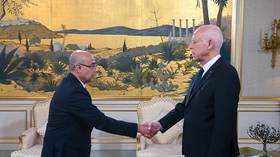Tunisian leader replaces nearly 20 cabinet members

Tunisian President Kais Saied has replaced nearly 20 members of his government, including those in charge of foreign affairs and defense, without providing an explanation for the decision, which comes just days after he sacked Prime Minister Ahmed Hachani.
The leader of the North African nation announced the reshuffle of 19 cabinet officials and three state secretaries in a statement on Sunday.
Saied appointed Khaled Shili as the new defense minister and Mohamed Ali Nafti to the foreign affairs ministry. The finance, justice, and interior ministers all retained their positions.
The latest shakeup comes ahead of the country’s presidential election on October 6, in which Saied is up for reelection against two other candidates.
Saied, a former law professor, came to power in 2019, promising prosperity in a country that has been grappling with economic difficulties dating back to the 2011 Arab Spring uprisings.
In July 2021, the 66-year-old politician suspended parliamentary activities, stripped MPs of their immunity, and fired then-Prime Minister Hichem Mechichi. His opponents accused him of staging a coup and reversing the nation’s achievements since the longtime ruler Zine El Abidine Ben Ali’s forced resignation in 2011 during the Arab Spring.
Saied has since amended the country’s constitution, granting himself the authority to appoint the prime minister and the entire cabinet unilaterally – a significant departure from the 2014 constitution, which gave parliament a major role in forming the government.
Last week, Human Rights Watch accused Tunisian authorities of using prosecution, conviction, and imprisonment to prevent eight opposition candidates from running in the upcoming presidential election.
The accusation came after the North African state’s electoral commission announced earlier this month that it had approved the candidacies of Saied, Zouhair Magzhaoui, who is thought to be close to the president, and Ayachi Zammel for the October vote, out of over a dozen hopefuls.
The president, who has repeatedly denounced foreign interference, has referred to his second-term bid as part of his commitment to “keep up the fight in the battle for national liberation.”













